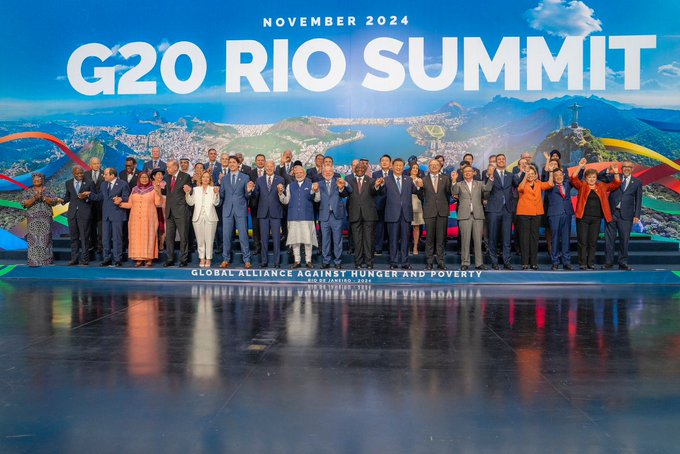
The G20 2024 Summit, held in Rio de Janeiro, Brazil, on November 18–19, served as a platform for African leaders to amplify their calls for transformative global reforms.
The African Union’s inclusion as a permanent member in September 2023 underscored a new chapter in global diplomacy—one where Africa’s voice on critical issues like debt sustainability, climate finance, and international taxation is not just heard but sought after.
“This is a pivotal moment for Africa to solidify its role as a rule maker, not a rule taker,” stated Executive Director of the African Forum and Network on Debt and Development (AFRODAD), Jason Braganza.
“The African Union’s full membership strengthens Africa’s ability to advocate for meaningful reforms and global equity.”
At the top of Africa’s agenda is the escalating debt crisis gripping many nations across the continent.
Leaders are urging reforms in global lending practices, calling for concessional financing and fairer assessments of risk and valuation.
“The incoming South African presidency offers the opportunity to emphasize the debt crisis in Africa and push for a more comprehensive reform package,” said Braganza.
President and CEO of the Africa Centre for Economic Transformation, Mavis Owusu-Gyamfi, outlined the critical steps needed to unlock Africa’s potential:
“Africa’s priorities in the global financial system are clear: increasing concessional finance, solving the debt crisis, curbing illicit financial flows, and developing an international tax framework that ensures African countries get their fair share of global taxes.”
The urgency to address these challenges is underscored by the fact that South Africa will assume the G20 presidency in 2025, hosting the summit on African soil for the first time in history.
Climate change, another pressing issue for Africa, is dominating discussions.
African leaders are advocating for equitable energy transitions and affordable climate finance to combat the continent's vulnerability to climate impacts.
Executive Director of the African Future Policies Hub, Faten Aggad, highlighted the stakes:
“With South Africa putting inequality at the center of its G20 presidency, there’s an opportunity to discuss options to reduce the cost of capital for the climate transition and ensure an equal transition for all.”
Assistant Professor at Georgetown University Ken Opalo, emphasized Africa’s need to resist carbon tax regimes that threaten export competitiveness:
“Africa must actively oppose carbon tax regimes that could harm our exports while advocating for trade policies that prioritize development.”
The 2024 summit also set the tone for South Africa’s historic presidency in 2025, which will focus on addressing the continent’s triple challenges of poverty, unemployment, and inequality under the theme ‘Fostering Solidarity, Equality, and Sustainable Development.’
With South Africa’s presidency aligning with the African Union’s Agenda 2063 vision, the continent is poised to position itself as a leader in driving sustainable development and economic reform globally.
As Africa enters this transformative phase, leaders are rallying for a unified approach to global advocacy.
“Africa needs a unified voice,” Opalo stressed. “We must coordinate our demands on the G20 to ensure our priorities reforming the global sovereign lending market and securing substantial climate finance are met.”








